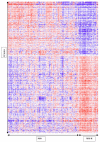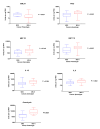Colorectal cancers with microsatellite instability display mRNA expression signatures characteristic of increased immunogenicity
- PMID: 15298707
- PMCID: PMC514528
- DOI: 10.1186/1476-4598-3-21
Colorectal cancers with microsatellite instability display mRNA expression signatures characteristic of increased immunogenicity
Abstract
Background: Colorectal cancers displaying high-degree microsatellite instability (MSI-H) have an improved prognosis compared to microsatellite stable (MSS) cancers. The observation of pronounced lymphocytic infiltrates suggests that MSI-H cancers are inherently more immunogenic. We aimed to compare the gene expression profiles of MSI-H and MSS cancers to provide evidence for an activated immune response in the former.
Results: We analysed tissue from 133 colorectal cancer patients with full consent and Local Ethics Committee approval. Genomic DNA was analysed for microsatellite instability in BAT-26. High-quality RNA was used for microarray analysis on the Affymetrix HG-U133A chip. Data was analysed on GeneSpring software version 6.0. Confirmatory real-time RT-PCR was performed on 28 MSI-H and 26 MSS cancers. A comparison of 29 MSI-H and 104 MSS cancers identified 2070 genes that were differentially expressed between the two groups [P < 0.005]. Significantly, many key immunomodulatory genes were up-regulated in MSI-H cancers. These included antigen chaperone molecules (HSP-70, HSP-110, Calreticulin, gp96), pro-inflammatory cytokines (Interleukin (IL)-18, IL-15, IL-8, IL-24, IL-7) and cytotoxic mediators (Granulysin, Granzyme A). Quantitative RT-PCR confirmed up-regulation of HSP-70 [P = 0.016], HSP-110 [P = 0.002], IL-18 [P = 0.004], IL-8 [0.002] and Granulysin [P < 0.0001].
Conclusions: The upregulation of a large number of genes implicated in immune response supports the theory that MSI-H cancers are immunogenic. The novel observation of Heat Shock Protein up-regulation in MSI-H cancer is highly significant in light of the recognised roles of these proteins in innate and antigen-specific immunogenicity. Increased mRNA levels of pro-inflammatory cytokines and cytotoxic mediators also indicate an activated anti-tumour immune response.
Figures


Similar articles
-
Tumour-infiltrating lymphocytes in colorectal cancer with microsatellite instability are activated and cytotoxic.Br J Surg. 2004 Apr;91(4):469-75. doi: 10.1002/bjs.4472. Br J Surg. 2004. PMID: 15048750
-
Microsatellite and chromosomal stable colorectal cancers demonstrate poor immunogenicity and early disease recurrence.Colorectal Dis. 2009 Jul;11(6):601-8. doi: 10.1111/j.1463-1318.2008.01639.x. Epub 2008 Jul 15. Colorectal Dis. 2009. PMID: 18637931
-
Different gene expression profiles between microsatellite instability-high and microsatellite stable colorectal carcinomas.Oncogene. 2004 Aug 19;23(37):6218-25. doi: 10.1038/sj.onc.1207853. Oncogene. 2004. PMID: 15208663
-
Clinicopathologic features in colorectal cancer patients with microsatellite instability.Mutat Res. 2004 Dec 21;568(2):275-82. doi: 10.1016/j.mrfmmm.2004.05.025. Mutat Res. 2004. PMID: 15542114 Review.
-
Immune evasion of microsatellite unstable colorectal cancers.Int J Cancer. 2010 Sep 1;127(5):1001-10. doi: 10.1002/ijc.25283. Int J Cancer. 2010. PMID: 20198617 Review.
Cited by
-
Mechanisms of Immune Escape and Resistance to Checkpoint Inhibitor Therapies in Mismatch Repair Deficient Metastatic Colorectal Cancers.Cancers (Basel). 2021 May 27;13(11):2638. doi: 10.3390/cancers13112638. Cancers (Basel). 2021. PMID: 34072037 Free PMC article. Review.
-
The homeobox gene MEIS1 is methylated in BRAF (p.V600E) mutated colon tumors.PLoS One. 2013 Nov 7;8(11):e79898. doi: 10.1371/journal.pone.0079898. eCollection 2013. PLoS One. 2013. PMID: 24244575 Free PMC article.
-
Evaluation of Pre-Treatment Serum Levels of IL-7 and GM-CSF in Colorectal Cancer Patients.Int J Mol Cell Med. 2014 Winter;3(1):27-34. Int J Mol Cell Med. 2014. PMID: 24551818 Free PMC article.
-
Distinct gene expression signatures in lynch syndrome and familial colorectal cancer type x.PLoS One. 2013 Aug 12;8(8):e71755. doi: 10.1371/journal.pone.0071755. eCollection 2013. PLoS One. 2013. PMID: 23951239 Free PMC article.
-
Immune Checkpoints as a Target for Colorectal Cancer Treatment.Int J Mol Sci. 2017 Jun 21;18(6):1324. doi: 10.3390/ijms18061324. Int J Mol Sci. 2017. PMID: 28635639 Free PMC article. Review.
References
-
- Aaltonen LA, Peltomaki P, Leach FS, Sistonen P, Pylkkanen L, Mecklin JP, Jarvinen H, Powell SM, Jen J, Hamilton SR. Clues to the pathogenesis of familial colorectal cancer [see comments] Science. 1993;260:812–816. - PubMed
Publication types
MeSH terms
Substances
LinkOut - more resources
Full Text Sources
Other Literature Sources
Medical
Research Materials
Miscellaneous

